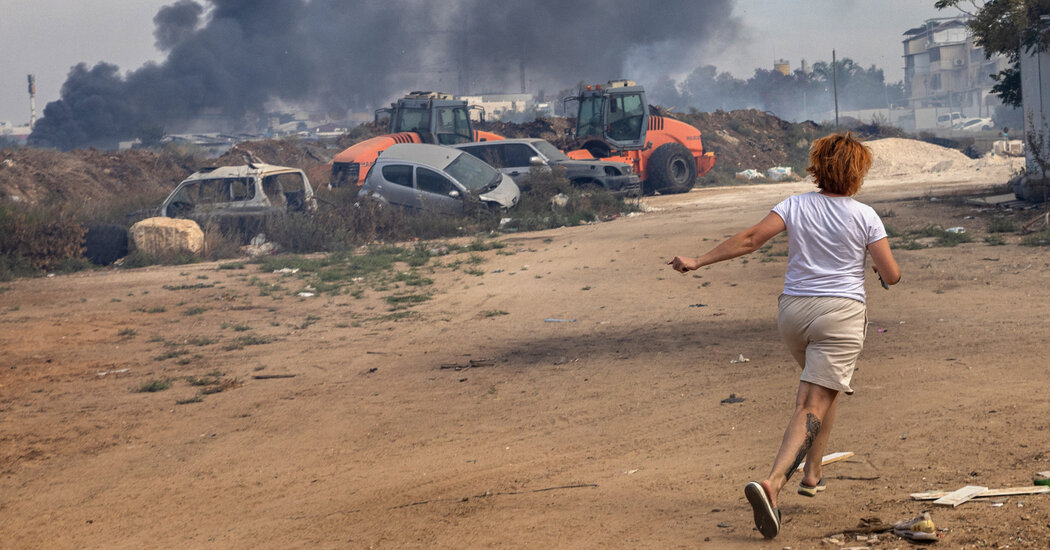Israel knew of Hamas plot more than a year ago
Israeli officials obtained Hamas’s battle plan for the devastating Oct. 7 terrorist attack more than a year before it happened, according to documents, emails and interviews, but they dismissed it as aspirational, considering it too difficult for Hamas to carry out. In fact, Hamas followed the blueprint with shocking precision.
Over about 40 pages, a document code-named Jericho Wall by the Israeli authorities outlined exactly the kind of devastating invasion that led to the deaths of about 1,200 people. It did not set a date, but it described a methodical assault designed to overwhelm the fortifications around the Gaza Strip, take over Israeli cities and storm key military bases.
Last year, shortly after the document had been obtained, officials in the Israeli military said that Hamas’s intentions were unclear. Then, in July, just three months before the attacks, a veteran Israeli intelligence analyst warned that Hamas had conducted an intense, daylong training exercise that appeared similar to what was outlined in the blueprint. Those concerns were brushed off.
Concessions: Israeli security officials have already acknowledged that they failed to protect the country, and the government is expected to assemble a commission to study the events leading up to the attacks. The Jericho Wall document lays bare the missteps that culminated in what officials now regard as the worst Israeli intelligence failure in five decades.
A new agreement for countries facing climate disasters
On the first day of the U.N.’s climate summit, known as COP28, diplomats from nearly 200 countries approved a draft plan for a fund to help poor countries hit by climate disasters.
The speedy adoption of the fund was widely viewed as a positive sign for the two-week summit in Dubai, but in a year that scientists say is “virtually certain” to be the hottest in human history, and as emission levels reach record highs, many attendees brought to the summit a sense of disillusionment with the U.N. effort.
“It’s impossible to ignore the fact that the summit is being held inside gleaming new facilities built with oil money,” said David Gelles, a reporter for The Times who is covering the summit.
Alistair Darling dies at 70
Alistair Darling, a British lawmaker and cabinet minister who played a leading role in his country’s response to the 2008 global financial crisis, rescuing troubled banks with huge injections of public money that staved off a broader economic collapse, has died at 70. The cause was cancer, his family said.
Former colleagues recalled a dry wit and a reputation for what Brian Wilson, a former Labour minister, called “a good moral and political compass.” And even his political foes in the Conservative government offered praise: Jeremy Hunt, the current chancellor of the Exchequer, said that Darling was “one of the great chancellors” and that he had done “the right thing for the country at a time of extraordinary turmoil.”
THE LATEST NEWS
Around the World
The rollout of a new tell-all book about the British royal family, “Endgame,” has been a hot mess after a thoroughly radioactive nugget turned up in the Dutch edition: the identities of two members of the royal family who once reportedly expressed concerns about the skin color of the unborn child of Prince Harry and his wife, Meghan.
None of the British papers initially published the names, referring only to a “senior royal.” But anyone equipped with a smartphone and Google could figure it out in less than 30 seconds.
SPORTS NEWS
Exceptional and excruciating: Another difficult night for goalkeeper Andre Onana.
Nothing but backboard: Banked free throws, an unorthodox technique, have a cult following among Korean basketball players.
The story of Nico Paz: Real Madrid’s Champions League match winner.
The 2034 Winter Olympics: Why Salt Lake City makes sense.
Remembering Shane MacGowan
Shane MacGowan, the brilliant but chaotic songwriter who as frontman for the Pogues reinvigorated interest in Irish music by harnessing it to the power of punk rock, died this week at 65.
Throughout his life, he earned twin reputations as a titanically destructive personality and a superlative songsmith whose lyrics painted vivid portraits of the underbelly of Irish immigrant life — in songs like the unlikely Christmas classic “Fairytale of New York.”
Bruce Springsteen described him as “a master” at his craft. “A hundred years from now most of us will be forgotten,” he said. “But I do believe that Shane’s music is going to be remembered and sung.”
For more: Amanda Hess, a critic for The Times, writes about MacGowan’s friendship with Sinead O’Connor.
Playlist: Listen to 9 essential tracks.

